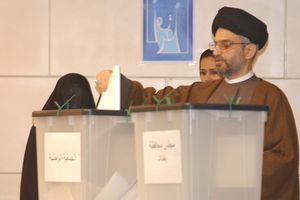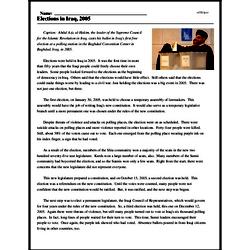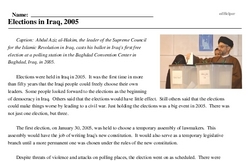Elections in Iraq, 2005
Caption: Abdul Aziz al-Hakim, the leader of the Supreme Council for the Islamic Revolution in Iraq, casts his ballot in Iraq's first free election at a polling station in the Baghdad Convention Center in Baghdad, Iraq, in 2005.
Elections were held in Iraq in 2005. It was the first time in more than fifty years that the Iraqi people could freely choose their own leaders. Some people looked forward to the elections as the beginning of democracy in Iraq. Others said that the elections would have little effect. Still others said that the elections could make things worse by leading to a civil war. Just holding the elections was a big event in 2005. There was not just one election, but three.
The first election, on January 30, 2005, was held to choose a temporary assembly of lawmakers. This assembly would have the job of writing Iraq's new constitution. It would also serve as a temporary legislative branch until a more permanent one was chosen under the rules of the new constitution.
Despite threats of violence and attacks on polling places, the election went on as scheduled. There were suicide attacks on polling places and more violence reported in other locations. Forty-four people were killed. Still, about 58% of the voters came out to vote. Each one emerged from the polling place wearing purple ink on his index finger, a sign that he had voted.
As a result of the election, members of the Shia community won a majority of the seats in the new two hundred seventy-five seat legislature. Kurds won a large number of seats, also. Many members of the Sunni community had boycotted the election, and so the Sunnis won only a few seats. Right from the start, there were concerns that the new legislature did not represent everyone.




